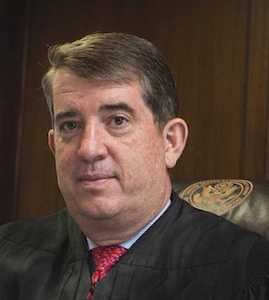Jackson Walker violated lawyer disciplinary and federal bankruptcy disclosure rules when it failed to disclose the romantic relationship between one of its lawyers and the judge in several high-profile bankruptcies, and the firm should be sanctioned and required to return more than $11 million it was paid in those cases, according to the U.S. trustee for the Southern District of Texas.
In a new court filing last week, U.S. Trustee Kevin Epstein wrote that “denial of all compensation is warranted because of Jackson Walker’s failures to disclose” the relationship between its then-partner and later former partner Elizabeth Freeman and U.S. Bankruptcy Judge David Jones during several major bankruptcy cases, including Neiman Marcus and Seadrill.

Jones, a Houston judge who oversaw the nation’s largest docket of complex, high-dollar corporate bankruptcies from 2019 through 2023, resigned last October amid an investigation by the U.S. Court of Appeals for the Fifth Circuit that he was having an improper relationship with an attorney practicing in his court.
Epstein, in a 55-page report filed in the Neiman Marcus case, said that the “undisclosed intimate relationship” between Jones and former Jackson Walker partner Elizabeth Freeman, who also clerked for Jones for several years, “significantly compromised the integrity of and public faith in the bankruptcy system.”
“Relief against Jackson Walker is necessary to restore faith in the bankruptcy system due to its failure to comply with the law protecting against conflicts of interest,” Epstein wrote. “The Bankruptcy Code requires that all debtor’s counsel satisfy rigorous standards for employment and compensation, including that counsel is both conflict-free and disinterested and remains so throughout the case.”
“Jackson Walker’s violations implicate both its retention and compensation in this case,” the U.S. trustee wrote. “Because Judge Jones lacked authority to approve those applications due to the undisclosed relationship that rendered both firm and judge conflicted, those orders approving them should be vacated under Rule 60(b)(6). Additionally, the Court should sanction Jackson Walker for its misconduct by ordering the return of fees and expenses paid in this matter, as well as ordering any other appropriate relief.”
“The U.S. Trustee’s motion to vacate is not premised on mere legal error in the employment and compensation of Jackson Walker,” Epstein wrote. “Rather, it is premised on conduct that goes to the fundamental fairness and integrity of the bankruptcy proceeding itself as well as a fundamental deprivation of due process. The infirmity here is so foundational that the court should vacate the Jackson Walker retention and compensation orders.”
Jackson Walker, in court documents filed in November, stated that it was unaware of Freeman’s romantic relationship with Judge Jones until 2022. The Dallas-based law firm claimed in its filings that Freeman lied to its lawyers about her relationship with the judge until 2022. The firm said that it quickly worked with Freeman to leave the firm’s partnership in December, but she continued to work closely with Jackson Walker bankruptcy lawyers, records show.
In addition, Jackson Walker has stated that it hired an independent legal ethics expert to evaluate the issue and provide it legal advice, which the firm claims it followed.
Epstein argued in the court documents that “Texas law imputes one attorney’s knowledge to all those in the firm.”
As a result, he wrote, “Jackson Walker was obligated to disclose what Ms. Freeman knew about her relationship with Judge Jones throughout her tenure —before March 2021, between March 2021 and March 2022, and between March 2022 and November 2022, regardless of when others at Jackson Walker knew definitively of the relationship.”
The U.S. trustee wrote that Jackson Walker attorneys, “particularly those in a supervisory role, violated the Local Rules and the Rules of Professional Conduct by failing to disclose Ms. Freeman’s relationship with Judge Jones.”
“When Jackson Walker sought employment as Debtors’ counsel, it represented that it was conflict-free and disinterested and had no disqualifying connections,” Epstein wrote. “But this was not true. Because Judge Jones should have been disqualified from hearing any case where Jackson Walker was counsel while Ms. Freeman was a partner, Jackson Walker’s and Ms. Freeman’s duty of candor required them to disclose the relationship.”
Epstein points specifically to the GWG Holdings bankruptcy, in which Jackson Walker “stated that it had searched for connections to judges and then wrongly attested ‘N/A’ that there were no such connections.”
“This was months after Jackson Walker partners indisputably learned in March 2022 that Ms. Freeman’s relationship was current, calling into further question the adequacy of the firm’s disclosure process and its failure to satisfy the ‘reasonably diligent inquiry’ standard,” the U.S. trustee wrote.
Epstein also slammed Jackson Walker’s internal investigation for not being “sufficiently independent or reasonably diligent.”
“Jackson Walker had an obvious financial interest in not finding out that Ms. Freeman had a continuing, intimate live-in relationship with Judge Jones because the firm could not then represent clients in cases pending before Judge Jones,” the U.S. trustee wrote. “As the firm explained, Jackson Walker sought an ethics opinion to “minimize the risk that the firm’s participation in future contested matters before the judge, through our partner or others, might result in disqualification of the judge or of us.”
“The legal risk to Jackson Walker was substantial because if the firm knew she was currently in an intimate relationship with Judge Jones, it would have had no ability to parse its ethical duties as Debtors’ counsel to avoid disclosing it, which would have disqualified the firm from representing clients before Judge Jones,” Epstein wrote. “And the financial risk was an existential threat because Judge Jones had the single-most large chapter 11 cases in the country, which contributed to the growth of Jackson Walker’s bankruptcy practice.”
